I recently graduated from UC Davis in June 2015. I majored in Psychology and minored in Human Rights. During my time at Davis, I was in a research lab that studied the impact of racial micro- aggression on Asian American students. After graduating, I became a Caseworker at the International Rescue Committee (IRC) and have been resettling refugees primarily from Afghanistan, Iraq, Iran, Jordan, Syria, Myanmar and Ukraine. I wouldn’t claim the title of a writer, but the stories I’ve heard from my experiences give me an urge to write slam poetry. My trip to Lebanon last year is what helped create “Look Into My Eyes.”

Kristina Hana Photography
LOOK INTO MY EYES
As the civil war in Syria enters its fifth year, millions are forced to flee their homes in hopes of seeking refuge in neighboring countries. Based on statistics from the United Nations High Commissioner for Refugees (UNHCR), Syria Regional Refugee Response, there are currently 3,997,538 registered Syria refugees (as of April 14, 2015)1. Roughly 2.2 million are located in Lebanon, Iraq, Jordon, and Egypt2. Another 1.7 million are located in Turkey3. Of the remaining, a majority are located in different parts of North Africa4. These statistics do not include the Syrians who fled without claiming refugee status.
Syrian refugees severely struggle in Lebanon as they face a multitude of limitations that inhibit land development, full access to education and jobs, and resettlement opportunities. There are a few nongovernmental organizations (NGO) that provide educational services to Syrian refugees and even fewer NGO’s that provide psychological support.
I was fortunate enough to visit some of the tent camps and makeshift settlements Syrian refugees are occupying in Lebanon. There is so much need, and yet, there is not enough support for Syrians in neighboring countries. Most service groups tend to focus on immediate food and shelter for refugees. Organizations are not considering longer lasting solutions for the Syrian crisis, such as job opportunities and proper resettlement programs. The international community is not providing enough support to countries impacted by the refugee crisis.
This piece is an attempt to simulate a spoken word accompanied by photos explaining aspects of refugee life from the perspective of a young refugee.
1, 2, 3, 4 Statistics from United Nations High Commissioner for Refugees, Syria Regional Refugee Response webpage (http://data.unhcr.org/syrianrefugees/regional.php)
Look into my eyes
And see what lies
Within my soul that rumbles To be recognized
and humanized
for more than just my troubles.
Do not scrutinize
or publicize
my life chained to this refugee tent.
Brutalized. Terrorized.
Commoditized for your good grace.
Daily, the thought of suicide
How’s that for a waste?
Do not de-legitimize my existence
or pacify my resistance
with your “feed me” signs, disregarding my persistence
To be alive, to thrive, and to derive
Meaning in this life – my promise to revive.
Don’t look at my rotting teeth or the lice in my hair
and have that be the reason you care,
but rather narratives of our stories will ensnare
and challenge the current state of our affair.
Five years of war has torn apart our homeland,
providing more agony than my people can withstand.
The blisters on my feet and scars on my face,
are a constant reminder of the images I can’t erase-
of bombs, of bullets, the smell of rotting skin,
the sight of my siblings hungry and all too thin,
the countless lives once close to me, lost,
lifeless bodies scattered and tossed.
End your synchronized scrutiny,
I despise the impunity of the international community
DO SOMETHING before I speak another eulogy.
End the lunacy
and help my people rise through unity.
All we need is an opportunity
To live.
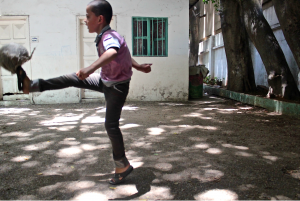
A Syrian refugee child plays football (American soccer) with a ball worn down to shreds. Many children in the makeshift settlements do not have the opportunity to play and are forced to sell materials on the street to support their families.
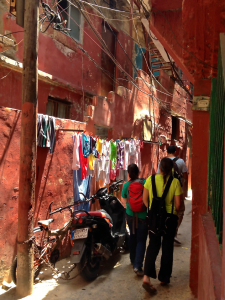
Many refugees in Lebanon reside in incomplete buildings that have no real source of electricity, running water, and sewage system. These makeshift settlements are crammed, littered and tagged with graffiti. Dead rats can be found scattered all over the ground alongside garbage piles.
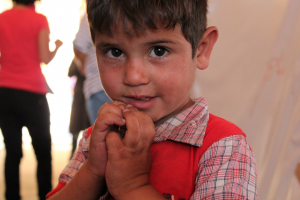
A young boy, at a tent school in the Beka’a Valley. Many children are sunburned, have lice, and are forced to bear the extreme elements with little clothes and (for some) no shoes. There is little for children to do in the valley. Half an hour before this photo was taken, a few children were playing with the corpse of a snake. Children are regularly left unattended as their parents are often working, searching for aid, or dealing with their own trauma.
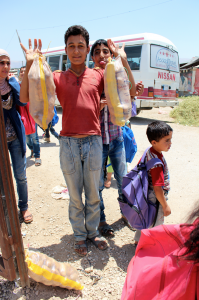
A 13-year-old refugee works in the crop fields in Beka’a Valley and sells his pickings to teachers after school. More often, children that are the oldest in their family sacrifice their education to provide immediate support for their younger siblings. Many Syrian refugees have either not gone to school since the conflict in Syria started or have never attended school because the conflict began before they were at school-age.
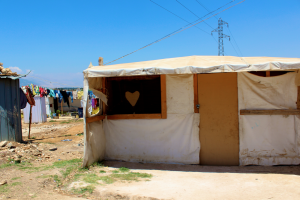
Families attempt to make loving homes out of the temporary tents in Beka’a Valley. These temporary tent camps have expanded since the beginning of the war in Syria and will expand as the conflict continues. This valley sees extreme weather changes during the year, as temperatures reach over 100ºF in the summer and snow falls in the winter. These tents do not adequately shelter refugees from the intense weather.
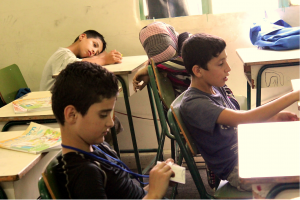
Although these children are fortunate enough to go to school, they are psychologically taxed. Many of them are constantly triggered from memories of their past in Syria while others are stuck wondering when their next meal will be. Some schools (like Jusoor: Syrians Forward Together) provide children with the only meal they have all day. About a fourth of the children that go to school during the day work in the evenings, selling flowers, napkins, and other items they can spare from NGO’s on congested streets. Families are forced to push children to their limits in order to earn extra money. There is a huge lack of psychological support for these children.
